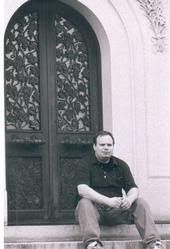When I first started 365 Days, I was surprised to see just how many zombie films--or films involving the dead returning to life--were centered around a love story. But when you think about it, it makes sense; the notion of a love so strong it defies death is a terribly romantic one, and the desire to be with that one true love forever is incredibly powerful.
It's a need that drives the 1972 film NEITHER THE SEA NOR THE SAND, which weaves elements of mystery and horror into a whirlwind romance. Susan Hampshire plays a young woman who meets a lighthouse keeper (Frank Finlay), with whom she begins an abrupt, passionate affair. Together they escape to a Scottish isle, where Finlay dies during a romp on the beach. But it'll take more than death to keep these lovers apart.
Director Fred Burnley, working from a screenplay by Gordon Honeycombe (who also wrote the novel it's based upon), posits that Hampshire and Finlay's love is so strong, so pure, that death cannot separate them, but don't go in expecting THE CROW. This film is first and foremost a romance, and I've got no problem with that, except that it's an exceptionally talky and slow romance; Burnley keeps the story moving with a pace roughly the speed of the average glacier.
And though there are times it feels deadeningly dull, there are a couple of moments that (almost) make it worth the effort. Finlay's initial return after his death is a creepy highlight, and turns up toward the end as a gradually rotting corpse. But Burnley merely skirts around the horrific, never truly embracing it, and these sequences quickly lose their impact.
NEITHER THE SEA NOR THE SAND is the kind of movie most people picture when they think "art film": long stretches of dialogue, a dearth of physical activity on screen, and an emphasis on theme over plot. It wants to be profound, but is much too plodding--and while Hampshire's character is intended to be a grief-stricken romantic, but often comes across as obsessive and weird once Finlay's dead, making any type of sympathy difficult.
Fans of '70s cinema, or the extraordinarily patient, may want to visit this one, but those seeking a more visceral experience should head elsewhere.
Wednesday, August 20, 2008
Subscribe to:
Post Comments (Atom)

No comments:
Post a Comment